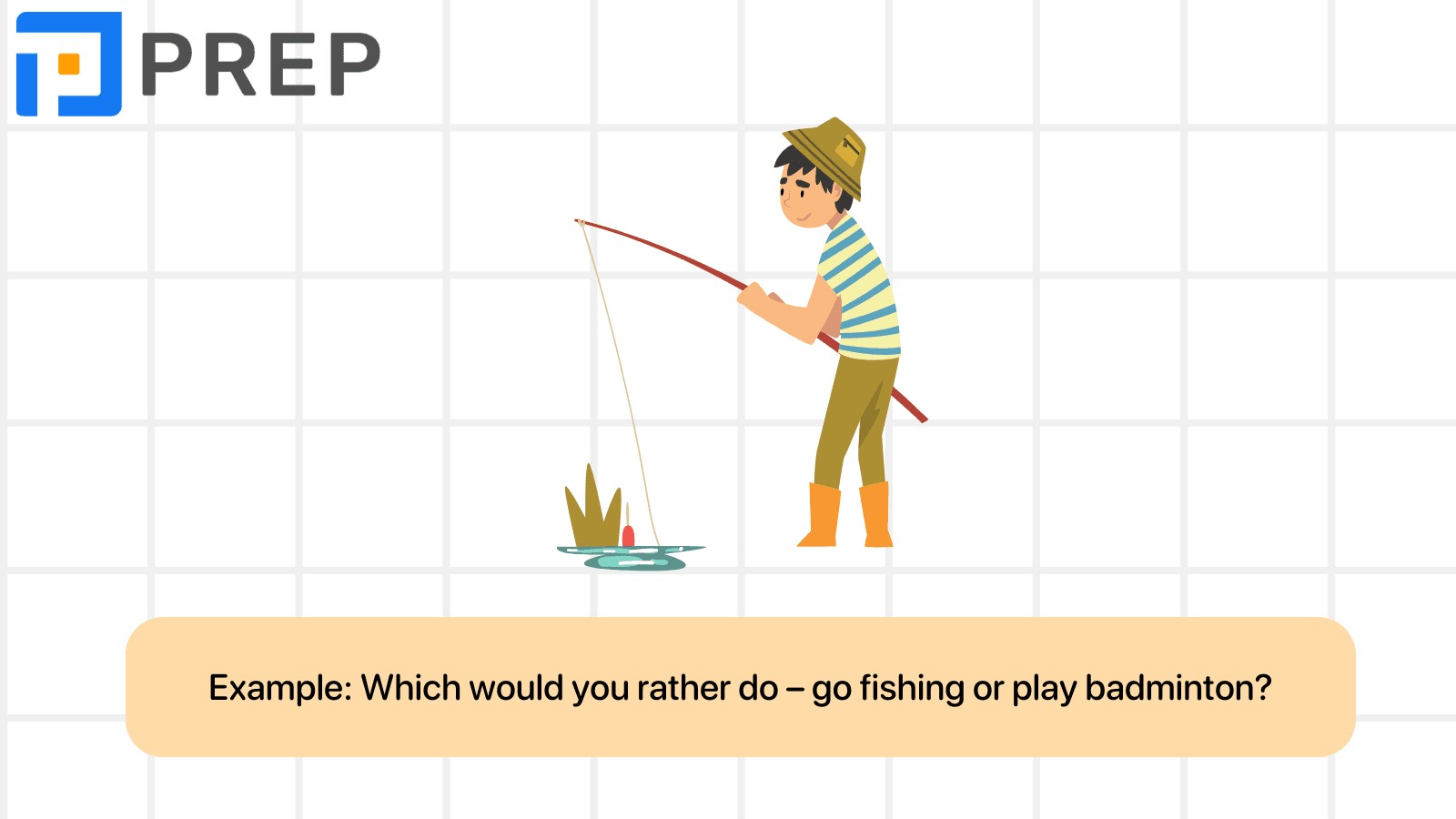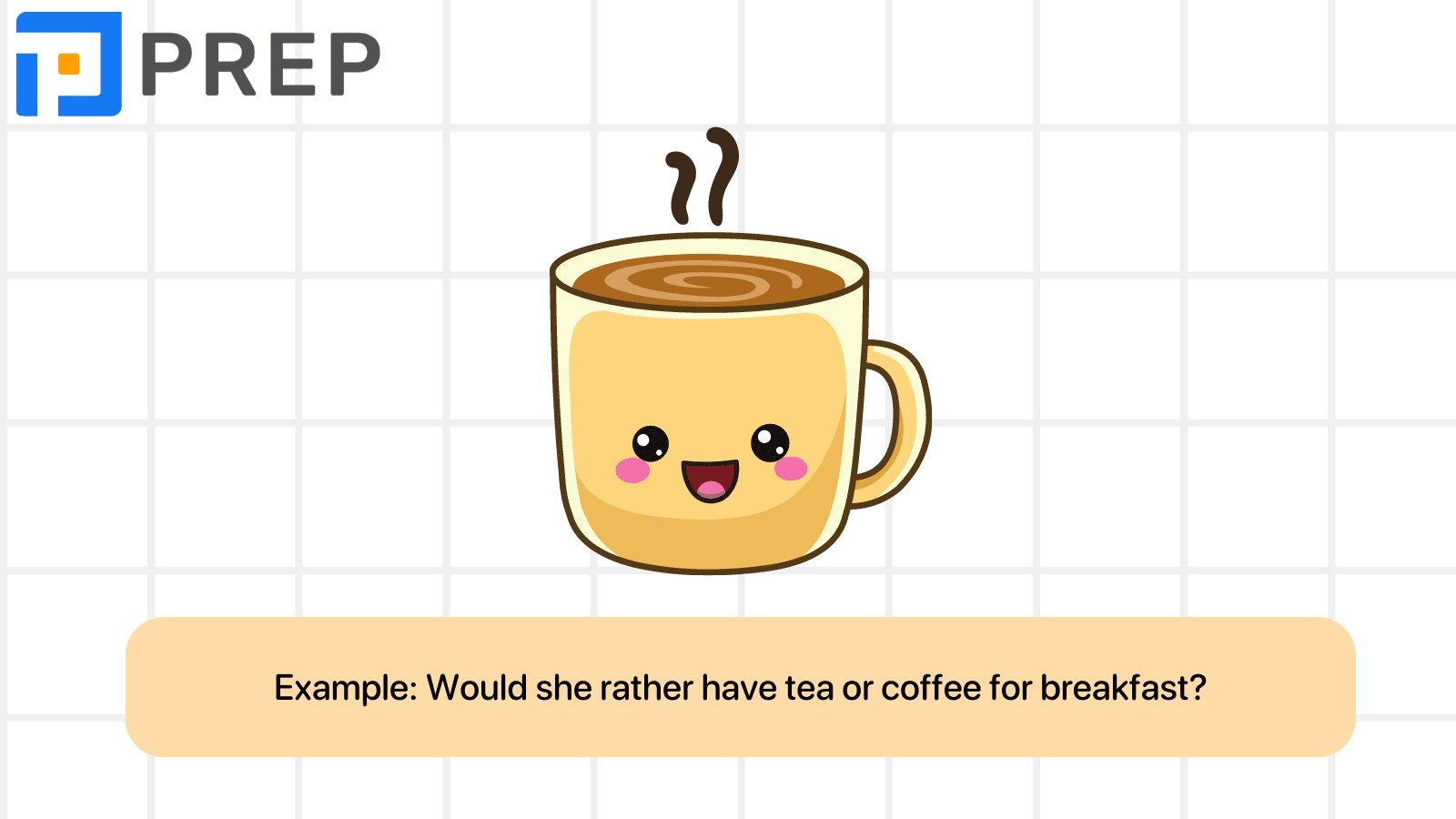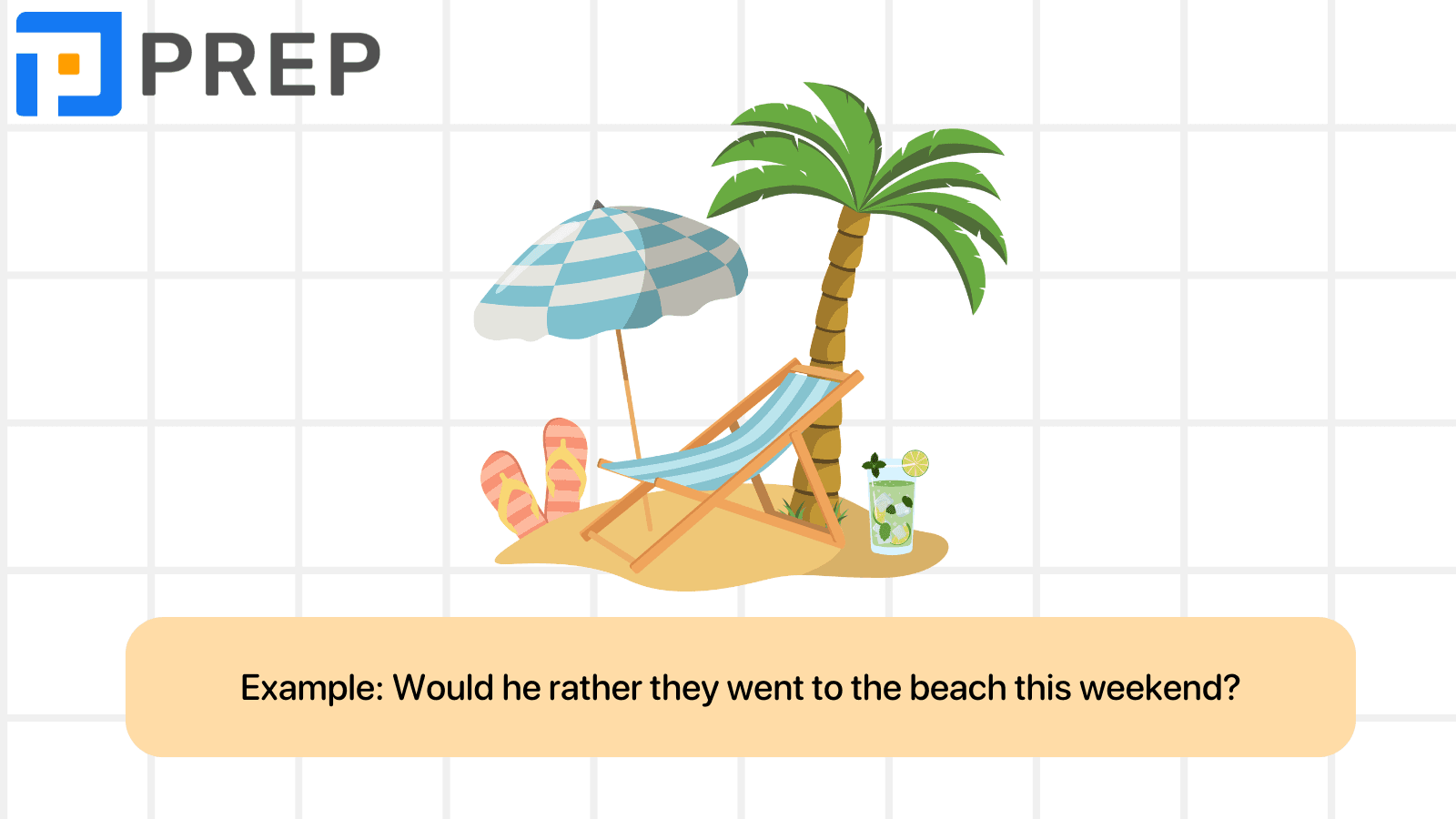Would Rather Meaning and Grammar with Examples
“Would rather” is a common English structure used to express preferences or choices. This guide will help you understand its grammar, when to use it with different subjects, how it compares to similar phrases, and how to apply it in real-world conversations.

I. What Does “Would Rather” Mean in English?
"Would rather" is a commonly used structure in English that expresses preference or choice. It functions similarly to "would prefer", but tends to be more concise and is frequently used in everyday conversation. This structure allows speakers to say what they would choose to do, or what they’d prefer someone else to do, often in contrast to an alternative.
The phrase "would rather" means "would prefer" and is used to express what someone likes or favors more in a particular situation, often appearing together with purpose clauses like in order to.
Examples:
- I would rather stay home tonight.
(Meaning: I prefer to stay home instead of going out.) - She would rather drink tea than coffee.
(Meaning: She prefers tea over coffee.)
"Would rather" can also be used to express a preference for someone else's action, especially when there are two different subjects in the sentence.
Example:
-
I’d rather you didn’t tell anyone.
(Meaning: I prefer that you do not tell anyone.)
Common Contexts
- To talk about current or future preferences: I’d rather walk than take a taxi.
- To express polite disagreements or subtle refusals: I’d rather not discuss that right now.
- To express imagined or hypothetical preferences: I’d rather you called me before coming.
In short, "would rather" is a versatile phrase that helps English learners communicate preferences clearly and naturally, both in spoken interaction and written English.

1. Grammar Structure of “Would Rather”
The grammatical structure of “would rather” varies depending on whether the subject of the sentence is the same or different in the main and subordinate clauses. Understanding these patterns is essential for using “would rather” accurately in both speaking and writing.
When the Subject Is the Same
When both actions refer to the same subject, “would rather” is followed by the bare infinitive (the verb without to).
Structure:
Subject + would rather + base verb
Examples:
- I’d rather stay at home tonight.
- She would rather go alone.
- They’d rather not talk about it.
Note: Do not use to before the verb - I’d rather to go → I’d rather go
This form is most commonly used to express a present or future preference.

When the Subject Is Different
When the subject of the second action is different from the subject of “would rather,” the subordinate clause takes a past simple tense. This is similar to imaginary or hypothetical situations (subjunctive meaning).
Structure:
Subject 1 + would rather + Subject 2 + past simple
Examples:
- I’d rather you stayed home tonight.
- She’d rather he didn’t join the meeting.
- We’d rather they arrived earlier.
Although the second verb is in the past simple, the meaning refers to the present or future — similar to how if and whether structures show different kinds of conditional or reported meaning.

Timeline or Tense Logic
-
Use the bare infinitive when referring to real preferences about oneself in the present or future.
Example: I’d rather sleep now. (real action) -
Use the past simple when expressing a preference about someone else's actions.
Example: I’d rather they didn’t call me tonight. (hypothetical or desired action)
By mastering these forms, learners can use “would rather” both confidently and accurately — and review quantifiers like a lot of vs plenty of for everyday fluency
2. “Would Rather” vs Other Similar Structures
English learners often find it difficult to distinguish between similar expressions such as “would rather,” “would prefer,” and “had better.” Although these phrases all involve choices or recommendations, they differ in usage, tone, and structure. Below is a complete comparison to help you understand when and how to use each one correctly.
|
Aspect |
Would Rather |
Would Prefer |
Had Better |
|
Usage Purpose |
Expresses personal preference |
Expresses personal preference (more formal or polite) |
Gives strong advice, warnings, or recommendations |
|
Grammatical Form (same subject) |
would rather + base verb |
would prefer + to + base verb |
had better + base verb |
|
Grammatical Form (different subjects) |
would rather + subject + past simple |
would prefer + subject + to + base verb |
Rarely used in this way |
|
Formality |
Neutral and conversational |
Slightly more formal |
Strong, more urgent or directive tone |
|
Consequence implied |
No |
No |
Yes – often implies a negative result if ignored |
|
Example (same subject) |
I’d rather stay home. |
I’d prefer to stay home. |
You’d better stay home. |
|
Example (different subjects) |
I’d rather you didn’t go. |
I’d prefer you not to go. |
Not commonly used like this |
|
Common Contexts |
Everyday conversation, expressing personal preferences |
Meetings, polite emails, formal writing |
Instructions, suggestions with consequences |
Key Differences
- Use would rather when expressing a simple preference, especially in casual speech. It is concise and more commonly used in conversation.
- Use would prefer to express preferences in a slightly more polite or formal way. It is more flexible in written communication and polite requests.
- Use had better when offering strong advice, warning, or recommendations. It suggests that something negative may happen if the advice is not followed.
SummaryBy learning how to distinguish between these expressions, English learners can improve both the accuracy and tone of their spoken and written language.
II. Practical Examples of “Would Rather” in Sentences
Understanding the grammar rules of “would rather” is important, but mastering its use requires seeing it in action. Below are practical examples across a variety of common situations to help you understand how “would rather” is used in both spoken and written English.
Examples with the same subject
When the subject of both verbs is the same, “would rather” is followed by the base form of the verb.
Examples:
- I would rather stay home tonight.
- She’d rather not talk about the issue right now.
- We would rather order takeaway than cook.
- He’d rather study in the morning than at night.
These sentences express a personal choice or preference about one's own actions.
Examples with different subjects
When the subject of the second verb is different, the second verb takes the simple past form (even though the meaning is present or future).
Examples:
- I’d rather you didn’t smoke here.
- She’d rather he arrived on time.
- We’d rather you handled the report instead of James.
- Their boss would rather they stayed late to finish the project.
This structure is often used to express politeness or a preferred action from someone else.
Examples with “rather than” for comparison
“Would rather” is often followed by “than” when comparing two actions or preferences.
Examples:
- I’d rather read a book than watch TV.
- They’d rather travel by train than fly.
- He would rather keep quiet than start an argument.
- She’d rather take the risk than miss the opportunity.
This form is useful for clearly stating a preference between two options.
Examples in questions
“Would rather” can also be used in interrogative sentences to ask about someone’s preference.
Examples:
- Would you rather eat out or cook at home?
- Would she rather work alone or in a team?
- Would they rather postpone the meeting?
- Would you rather I call you later?
These types of questions are common in both friendly conversations and formal discussions.
Using these practical examples in your daily speaking or writing practice will help reinforce both the meaning and grammatical structure of “would rather.” Try substituting your own situations to make the expressions more personal and easier to remember.
III. From Beginner to Band 7
In this article, PREP provided details about "Would rather". If IELTS feels overwhelming, our step-by-step courses can make it easy—start now :
-
IELTS preparation: Mastering IELTS exam from zero to hero

Hi I'm Chloe, and I am currently serving as an Product Content Administrator at Prep Education. With over five years of experience in independent online IELTS study and exam preparation, I am confident in my ability to support learners in achieving their highest possible scores.
Comment
Premium content
View allPersonalized roadmap
Most read












